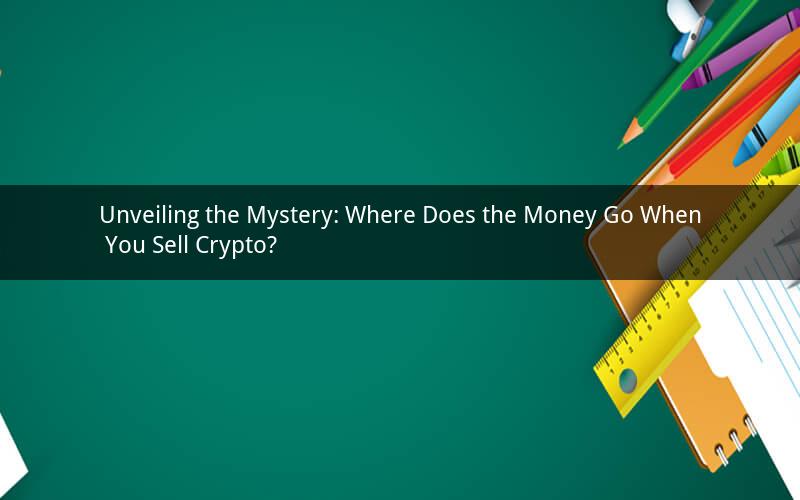
When it comes to selling cryptocurrency, one of the most common questions that arise is, "Where does the money come from?" Understanding the flow of funds during a crypto sale is crucial for both beginners and seasoned investors. In this article, we will delve into the intricacies of this process and shed light on the various aspects involved.
1. Understanding the Transaction Process
When you sell crypto, the transaction process involves several steps. First, you need to choose a cryptocurrency exchange or platform where you can sell your digital assets. Once you have selected a platform, you will need to create an account and complete the necessary verification procedures. After that, you can deposit your crypto into the exchange's wallet.
Once your crypto is in the exchange's wallet, you can initiate a sell order. This order will be matched with a buyer's order, and once the trade is executed, the buyer's payment will be credited to your exchange account. Now, let's explore where this money comes from.
2. The Buyer's Perspective
The money that you receive when selling crypto comes from the buyer. The buyer might be an individual, a business, or even another investor looking to diversify their portfolio. The buyer's motivation for purchasing crypto can vary, including speculation, investment, or even a belief in the underlying technology.
When the buyer decides to purchase crypto, they will typically use one of the following methods:
a. Fiat Currency: The buyer can use their bank account or credit card to purchase crypto on an exchange. In this case, the money comes from their bank account or credit card, and the exchange processes the payment on their behalf.
b. Other Cryptocurrencies: The buyer can also use other cryptocurrencies to purchase your crypto. This method is common among crypto enthusiasts who prefer to trade directly without converting to fiat currency.
c. Exchange Traded Funds (ETFs): Some buyers might use exchange-traded funds that track the price of cryptocurrencies. By purchasing these funds, they gain exposure to crypto without directly owning the digital assets.
3. The Role of Exchanges
Exchanges play a crucial role in facilitating the transaction process. When you sell crypto, the exchange matches your sell order with a buyer's order. This matching process ensures that the buyer receives the desired amount of crypto, and you receive the equivalent value in fiat currency or another cryptocurrency.
The exchange also acts as an intermediary between buyers and sellers, ensuring a secure and efficient transaction. Moreover, exchanges may charge a fee for their services, which is usually a percentage of the transaction value.
4. The Regulatory Aspect
Regulatory authorities around the world have been increasingly focusing on the cryptocurrency market. When you sell crypto, you may be subject to certain regulations, such as tax obligations and anti-money laundering (AML) measures. The money you receive from the sale may be subject to taxes, depending on your jurisdiction.
In some cases, the buyer might be required to provide identification and undergo a background check to comply with AML regulations. This process ensures that the funds used for purchasing crypto are not derived from illegal activities.
5. The Importance of Security
Security is a vital aspect of the crypto market. When you sell crypto, it's essential to ensure that your funds are transferred to a secure and reputable wallet. Exchanges typically offer various wallet options, including hot wallets (online) and cold wallets (offline).
Hot wallets are more accessible but may be more susceptible to hacking attempts. Cold wallets, on the other hand, are offline and offer a higher level of security. It's crucial to choose a wallet that suits your needs and preferences.
Frequently Asked Questions
1. Q: Can I sell crypto without using an exchange?
A: Yes, you can sell crypto directly to another individual or business, but this process might be more complex and less secure than using an exchange.
2. Q: Are there any fees associated with selling crypto?
A: Yes, exchanges usually charge a fee for their services, which is a percentage of the transaction value. Additionally, you may be subject to tax obligations, depending on your jurisdiction.
3. Q: Can I sell crypto without revealing my identity?
A: Selling crypto without revealing your identity is challenging and may raise red flags with regulatory authorities. It's advisable to comply with AML regulations and provide necessary identification when selling crypto.
4. Q: What is the best way to store my crypto after selling it?
A: The best way to store your crypto after selling it depends on your needs and preferences. If you plan to sell crypto regularly, a hot wallet might be suitable. However, for long-term storage, a cold wallet is recommended.
5. Q: Can I sell crypto and immediately use the proceeds to buy another cryptocurrency?
A: Yes, you can sell crypto and immediately use the proceeds to buy another cryptocurrency. This process is known as a "trade-to-trade" transaction and is a common practice among crypto investors.
In conclusion, understanding where the money comes from when you sell crypto is essential for a smooth and secure transaction. By following the outlined steps and considering the various aspects involved, you can navigate the crypto market with confidence.